-
About
First-Year Application Deadline
Don't miss your chance to apply to Marist and join the Red Fox Family!
• Early Decision II and Regular Decision: Sunday, Feb. 15About
-
Academics
First-Year Application Deadline
Don't miss your chance to apply to Marist and join the Red Fox Family!
• Early Decision II and Regular Decision: Sunday, Feb. 15Academics
-
Admission & Financial Aid
First-Year Application Deadline
Don't miss your chance to apply to Marist and join the Red Fox Family!
• Early Decision II and Regular Decision: Sunday, Feb. 15Admission & Financial Aid
-
Student Life
First-Year Application Deadline
Don't miss your chance to apply to Marist and join the Red Fox Family!
• Early Decision II and Regular Decision: Sunday, Feb. 15Student Life
- Athletics
Students talking in front of posters

Mac Mugabo
Kigali, RwandaAcademic School
Liberal Arts, Management, ScienceCampus
New YorkMac Mugabo ’21 has a deep and abiding interest in human rights and social justice, which is not surprising given his background. Mugabo, a double major in economics and political science with a minor in environmental policy, grew up in Rwanda, which suffered the devastating genocide against the Tutsis in the spring of 1994. About one million people were killed. Like most Rwandans, Mugabo’s family was impacted by the genocide: he lost relatives, and his parents were refugees for a time.
When a friend told Mugabo about the Humanity in Action Fellowship in Sarajevo, he was immediately interested in applying. Humanity in Action is an international organization that educates, inspires, and connects a network of university students and young professionals committed to promoting human rights, diversity, and active citizenship in their own communities and around the world. The annual Humanity in Action Fellowship brings together more than 150 Fellows in summer programs in Denmark, France, Germany, the Netherlands, Poland, the United States and Bosnia and Herzegovina to discuss, learn, and research in international groups. Fellows meet leading experts and activists to study historical and contemporary cases of institutional violations of human and minority rights.
From June 8 to July 3, Mugabo joined 15 other Humanity in Action Fellows in Sarajevo, including students from the University of Pennsylvania, Tufts University, Bard College, the University of Sarajevo, King’s College London, Goethe University, and the University of Copenhagen. Says Mugabo, “I was humbled to encounter the people I did. Some had master’s degrees, and some worked for the United Nations, but all were so intelligent and open. I felt privileged to work alongside others who shared my values and wanted to learn from my experiences. It feels so good to know that you’re not alone, that there are so many others working toward positive change in society.” The group attended lectures and workshops from various experts and visited study sites such as Banja Luka, Prijedor, Srebrenica, Konjic, and Mostar.

All of the Humanity in Action Fellows worked on a project during their time in Sarajevo, and Mugabo’s focused on establishing opportunities for dialogue between Muslims and Serbs. As part of his project, Mugabo and three other Fellows created a video blog dedicated to reconciliation among Bosnian youth and exploring the “invisible borders” keeping them apart. They interviewed and filmed young people talking about what it’s like to live in divided cities, how they felt about traveling and going to the “other side,” and the obstacles they faced. Their collective efforts were made into a video representing what the young people of Bosnia think of reconciliation and mobility, which was presented to students at a workshop on filmmaking by Humanity in Action.
The month-long fellowship gave Mugabo the opportunity to reflect on the similarities and differences between the genocide against the Tutsis and the genocide that occurred during the Bosnian Civil War from 1992-95. According to Mugabo, “It was interesting to compare the experiences of Rwanda and Bosnia. Rwanda was basically abandoned by the international community, while the international community intervened militarily and set up a political system in Bosnia. Yet, Rwanda is in a much better place now. It’s becoming an economic powerhouse that has made a great deal of progress on reconciliation and national healing. In Bosnia, however, there’s still a lot of division and unaddressed pain.”
Mugabo believes the difference lies in who was in charge of the recovery and reconciliation process. “Rwanda had to figure out a new system for itself after the genocide. There was a big cultural shift to unite the population. We no longer think of ourselves as Tutsi or Hutu or Twa – we’re all Rwandans.” In Bosnia, on the other hand, the postwar political system was created (some would say imposed) by the international community, and therefore never really received local buy-in. People still identify strongly with their ethnic groups, i.e., Muslims, Serbs, and Croats. Notes Mugabo, “Being in Bosnia helped me appreciate how our tragedy isn’t questioned. There’s an accepted narrative.” He adds, “I’m especially interested in mental health in post-conflict societies. You have to want to forgive – it can’t be imposed. After a national trauma, it might seem impossible to conceive of what comes next, but the Rwandan model shows that it’s possible to transcend disunity and conflict.”
Heading into his junior year at Marist, Mugabo is energized by his Sarajevo trip and looking forward to getting back to campus. He notes that he’s one of seven Rwandans at the College, and there are many other international students. Mugabo reports always having felt supported and cared for, and he especially appreciates Marist’s annual commemoration of the genocide against the Tutsis. “I feel the Marist community is always rooting for you and willing to help,” he says. He’s especially grateful to Graduate School and Fellowship Advisor Pat Taylor, who helped with his Humanity in Action application, and to Marist alumna Darriel McBride ’17, who was also a Humanity in Action Fellow and who encouraged his application. Says Taylor, “I first met Mac when he was a freshman. He impressed me as someone possessing an uncommon authenticity and genuine commitment to working for the betterment of humanity.”
Even though Mugabo only sees his parents back in Rwanda once a year, he doesn’t feel homesick. “What I considered home seems to have expanded at Marist. Home is not just a physical space – it’s the people and relationships. Nonetheless, I will always be grateful for my family’s unyielding support, even when they are a continent away.” Looking ahead to life after graduation, Mugabo is considering graduate school or opportunities to advance human rights and social justice. And he is emphatic that you don’t have to travel halfway around the world to make a difference. “Activism doesn’t have to be that complex. Donate money to causes you care about. Educate yourself and others about what’s going on in the world. Empathize with people who are suffering. No one is too young or too old to share their tools.”



